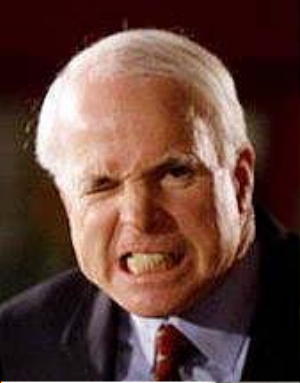
McCain (second from left) and Goldwater (far right, no pun intended)
Everyone's trying to compare this election to past elections. Is it like 1992, where the economy trumped every other issue and swept a young Democrat into office over a much older Republican? Is it like 1980, where people wanted to throw the incumbent party out of the White House but had reservations about the relatively inexperienced but very charismatic challenger until the debates? The answers are kind of and yes. But for now I want to look at the last time the Republicans nominated a veteran Arizona senator, 1964.
Then, the nominee was Barry Goldwater. Goldwater was the de facto leader of the conservative faction in the GOP in an era when the Republican party was dominated by moderates, many of whom were from the northeast, like Pennsylvania Governor William Scranton, Michigan Governor George Romney, New York Governors Thomas Dewey and Nelson Rockefeller and the symbol of moderate Republicanism, Dwight Eisenhower. Many conservatives, both in and outside of the party, were frustrated with the Republican nominee frequently being someone who more or less echoed the policies of Democrats. They never heard their candidates talk about total victory over communism abroad (even if it meant using nuclear weapons in Asia,) and what they saw as the overexpansion of the federal government's authority over states with the new pressures of civil rights legislation. They were becoming disenchanted with their party's leadership, and they found their savior in Senator Goldwater.

(Yes, this is all going somewhere.)
Goldwater prevailed, and the conservative wing of the party finally had their own candidate, but the trouble was far from over. The 1964 Republican National Convention in San Francisco showed a party divided. Rockefeller was booed, hissed and shouted down by the audience during his speech when he said that the party must repudiate extremism, to the point where TV cameras caught his wife sobbing in the stands at the Cow Palace. The Goldwater Republicans were behind their man 100% and were willing to roll over anyone who disagreed, even if they were in the same party. This was the environment that Goldwater, who was not crazy himself, had fostered.

But Goldwater wasn't above using the code words that had gained Wallace such a large following in southeastern Wisconsin (racism in Milwaukee? I know, it shocked me, too,) northern Indiana and Maryland, not to mention the South. "State's rights," "law and order," and allusions to "mobs in the street" caught the attention of fearful whites across the country and drew them to Wallace, and later Goldwater. The KKK, the John Birch Society and other far right groups supported Goldwater, whose Jewish ancestry didn't seem to bother them as long as he kept saying what they liked hearing. Goldwater wasn't a candidate to them as much as he was a vessel for their fear of a black country. And Goldwater wasn't in much of a position to denounce them, because the other wing of his party had hurt (and been hurt by) Goldwater so badly during the primaries and convention.

What does this have to do with 2008? We have another self-styled maverick Arizona senator representing the GOP in a presidential campaign, and again race is a big factor in this election. The nominee (who has called Goldwater a political hero of his, though the feeling might not have been mutual) has seen his longshot candidacy falling apart with dropping poll numbers and has resorted to stoking fears of the scary black man. Like Goldwater, McCain's rallies are filled with people who see him as less of a candidate and more of a sounding board for them to speak on the "Arab terrorist" who makes them "fearful to raise their children in America." Sarah Palin makes speeches that only encourage these attitudes, and "kill him," "terrorist," and "off with his head" have been heard at McCain/Palin rallies.
While McCain, like Goldwater, isn't a racist in my opinion, he hasn't done much to try and stop the vitriolic crowds. And, as his Friday rally (the one where he was booed for calling Barack Obama a decent man) in Lakeville, MN showed, maybe there's nothing he can do. But this is an atmosphere of hatred, where the opponent is seen not as a rival, but an enemy. Like Goldwater, McCain has been swept up by this movement and had its own goals projected on to him. Like Goldwater, it has people within his own party questioning not just the candidate, but the state of the party as a whole. Chris Buckley wrote an excellent piece about how his disappointment in the McCain campaign's tone has him ready to vote Obama. In 1964, the Johnson campaign ran this ad, where a Republican in the Buckley tradition explains his uneasiness with what Goldwater has brought to the Republicans.
The lessons from 1964 unfortunately have not been learned by John McCain. Like Goldwater, he will likely go to bed on November 4 disappointed. Like Goldwater, much of this is beyond his control. But this could be bigger than any one campaign. The fears Wallace and Goldwater helped encourage would last throughout the 20th century. McCain had an opportunity to not go down that same road, to lose with his dignity intact, but his willingness to feed into the fears of America's most ignorant in a desperate attempt at victory will at best taint his legacy. At worst, it will hinder American progress.
Thanks to Gary Donaldson's Liberalism's Last Hurrah for teaching me damn near everything I could ever learn about the 1964 election.
No comments:
Post a Comment